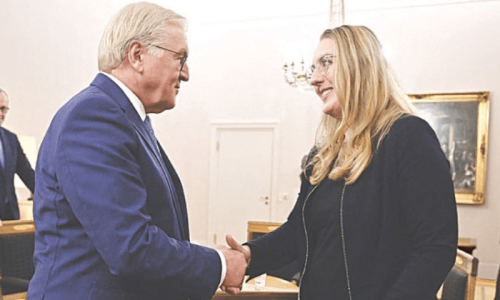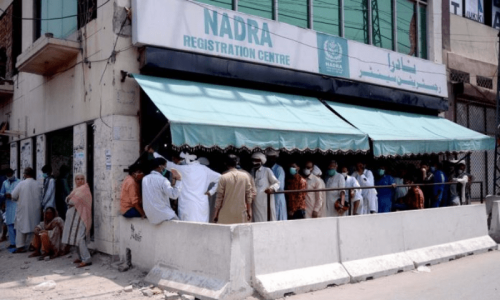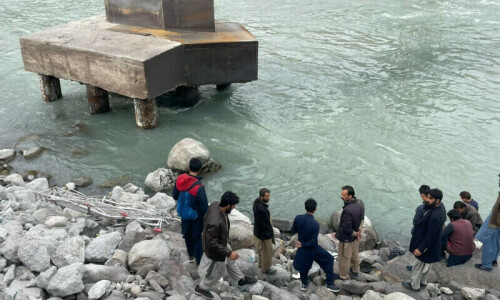What sanity demands
THE Iran nuclear crisis is hotting up again. New developments have belied the hopes raised by the Russian proposal on which Moscow and Tehran had been negotiating. An agreement is still an elusive prospect. While Iran has offered to extend its moratorium on the industrial-scale production of nuclear fuel for two years and Russia is willing to have a joint project with Iran on Russian soil for the enrichment of uranium, the dispute lingers on. President Ahmadinejad’s government is demanding the right to run a small-scale enrichment research programme. This is anathema to the western nuclear powers, especially the United States, which view any such idea with suspicion. This approach smacks of chicanery in view of President Bush’s extraordinary keenness to provide nuclear technology to India, which is a nuclear power. What is more serious is the hardline and hawkish American and Israeli reaction to the current crisis. There has been open talk of attacking Iranian nuclear facilities. This plan, if actually carried out, would be tantamount to a full-scale war. Iran’s nuclear facilities are scattered over different parts of the country and even precision strikes at a number of cities would amount to unleashing a war of aggression.
It is important that the Bush administration and its protege, Israel, should stop attempting to destabilise the region by warning Iran of ‘meaningful consequences’ as Vice-President Dick Cheney did on Tuesday. Such talk only encourages the hawks in America and Israel while it undermines the peace efforts which are still continuing. For the present the focus has shifted to the IAEA, whose board of governors has been meeting this week to consider the issue. The director-general, Mohamed ElBaradei, believes that a peaceful solution to the problem can still be found and he has appealed to the parties to return to the negotiating table. Experts believe that American fears of Iran manufacturing a bomb are unfounded. At present, Iran is using 20 centrifuges for research only to separate uranium isotopes for the fission process. To make even one bomb a year — for which enrichment has to be to a higher level — 1,500 centrifuges will be needed to produce enough enriched uranium. Iran has 1,200 or so centrifuges, but not all are in usable condition.
It appears that the IAEA is working on a compromise formula by seeking to restrict Iran’s enrichment activities in the research sector. Mr ElBaradei’s latest report to the agency’s board of governors now under discussion has still not found clues to a ‘smoking gun’ to hold Iran guilty of proliferation. Hence, there are indications that the final decision may have to be left to the UN Security Council as to what action is to be taken. It is plain that in the absence of clear legal grounds, the issue has become political and strategic and therefore America’s warnings and threats. One hopes that Iran also decides on its policies keeping in mind the political and strategic realities. Under the NPT Tehran stands on solid ground. But if compromises are to be made to prevent a fatal war, they will have to be considered because a war would prove devastating not only for Iran but also for the entire Middle East. The region is already in turmoil, thanks to America’s aggression in Iraq and Israel’s bellicosity vis-a-vis Palestine. Another destabilizing factor in the form of American/ Israel aggression against Iran would be catastrophic.
Blasts in Varanasi
NO group has yet claimed responsibility for the three blasts in the Hindu holy city of Varanasi on Tuesday, but whosoever carried out this dastardly act deserves to be condemned. While one of the bombs went off in a temple, the other two exploded at the railway station. In all, 21 people were killed and scores of others injured, the aim obviously being to sow panic. The blasts come in the wake of the massacre of 30 people by Maoists in the state of Chattishgarh on Feb 28. There was also a Hindu-Muslim riot in Lucknow during US President George Bush’s visit to India, but it seems unlikely that Tuesday’s blasts could have any links with that. The Indian government has not blamed any organization for the attack, but the UP police chief has been quoted by a western wire agency as saying that it could be the work of “Pakistan-based Lashkar-i-Taiba.”
A big swathe of Indian territory — from the Nepalese border to Andhra Pradesh — is in the grip of guerrilla activity by anti-government Maoists, yet some elements in India miss no opportunity to find the involvement of Kashmiri separatist and “Pakistan-based Islamist militant groups” in any incident. It is not clear what precisely Kashmiri separatist groups would expect to gain from massacring innocent worshippers. In fact, their hand in such senseless massacres would deprive them of the sympathy they enjoy for fighting for the cause of Kashmir’s freedom. There could also easily be home-grown militant groups in India. There is, however, a pattern, for whenever things seem to be settling down — the Babri mosque issue seems behind us and Indian courts have exonerated Muslims of the charge of burning the Gujarat train — a terrorist act takes place that has the potential to re-ignite communal strife. The Indian government and the opposition should not allow the crime at Varanasi to be exploited by communal elements for political purposes. One hopes that Indian security agencies will get to the bottom of the matter and let the world know who the perpetrators of the crime were.
Model orphanages
THE facilities provided for orphans of the Oct 8 earthquake victims at a number of orphanages run by the non-profit organization ‘Save Our Souls’ in Punjab present a model for other NGOs and philanthropic groups dealing with the aftermath of the massive tragedy. The Edhi and Citizens’ foundations and many other entities, too, have done their bit for providing shelter to the survivors of the quake, especially children, filling the gap left by state-run institutions. The latter are far and few anyway, and these could not have been able to take care of the large number of under-age destitutes thrown up by the tragedy in Azad Kashmir and the NWFP. The latest SOS village that opened in Sialkot district on Sunday has taken in some 40 earthquake orphans, while the organization’s Rawalpindi and Lahore chapters are home to over 100 such children. Under a global mandate, the NGO provides the orphans with as natural and fulfilling a home environment as possible under the circumstances. Children are divided into small groups and paired together to form a group of five each under the care of a foster mother as siblings in independent housing units set up within the SOS village compound. The globally tested arrangements help the children to deal with the trauma of having lost their parents, enjoy a family-like environment and have access to basic health, hygiene, education and recreational facilities.
The Punjab government has done well to provide land for the setting up of the new SOS village near Sialkot. The area was selected because it is an emerging industrial hub where orphaned children are known to have been forced into child labour by unscrupulous relatives. There is a need for all the four provincial governments to identify more such locations in their respective districts where a similar problem may be depriving children, especially those without parents, of their right to a proper upbringing and care. One says this because there is no dearth of villains in society who prey on such children, forcing them to beggary, bonded labour or smuggling them to the Gulf to work as camel jockeys.
A new South Asian order in the making
DESPITE the concessions made by Pervez Musharraf for Washington, President Bush’s approach to South Asia indicates very clearly a major shift in US policy, refracted most sharply by his visit to the region. Not only has US policy de-linked India and Pakistan as meriting some semblance of parity, India seems to be getting the lion’s share of Bush’s attention as well as his administration’s favour.
This is as much a reflection of India’s pull as the largest democracy in the world as it is about attracting Indian markets or about countering the growing weight of China in Asia as well as the global stage.
First of all, the Bush administration sees India not only as a functioning democracy, it regards New Delhi as a stable manager of conflict and transition. Delhi’s capacity to absorb internal dissent without significant threats to central stability is quoted widely as a key factor attracting US state and private investor confidence.
Secondly, the scope of the new partnership between the US and India is being seen not only at a regional level, but as embracing a larger global strategic vision. If there are any doubts about the limits of the military partnership between the two, it has been eliminated by the unusually explicit statement issued by the US defence department hailing the deal as opening a path for more American-Indian military cooperation. “Where only a few years ago, no one would have talked about the prospects for a major US-India defence deal, today the prospects are promising, whether in the realm of combat aircraft, helicopters, maritime patrol aircraft or naval vessels,” the statement said.
Although resistance is expected from China, it is probable to expect Britain, France, Germany and possibly Russia to fall into line with the agreement, in part because it would clear the way for them to sell nuclear fuel, reactors and equipment to India.
The negotiated accord announced Thursday by President Bush and Prime Minister Manmohan Singh in New Delhi is aimed at removing the ban effectively imposed by the Nuclear Non-Proliferation Treaty (NPT) on the sale of fuel and civilian nuclear technology to India, in return for India ‘s agreement to put its civilian reactors under international inspections. According to this deal, India will be able not only to retain its nuclear arms programme but also to keep a third of its reactors under military control outside international inspection including two so-called fast-breeder reactors that could produce fuel for weapons.
In essence, the accord announced in New Delhi would place 14 of India ‘s 22 nuclear reactors under civilian inspection regimes by 2014. The phase-in time along with very real possibility that breeder reactors may never come under such a regime have unleashed a volley of objections from critics.
While senior scholars at the independent Carnegie Endowment for International Peace call this deal an example of “Santa Claus negotiating” in terms of dropping all established nuclear regime principles, critics of the deal in Congress and Pakistan focus on what they maintain is a double standard embraced by the Bush administration: in effect, allowing India to have nuclear weapons and still get international assistance but insisting that Pakistan, Iran, North Korea and other “rogue states” be given no such waiver.
Yet administration officials insist that there was no double standard at play here. “The comparison between India and Iran is just ludicrous,” R. Nicholas Burns, the under secretary of state for political affairs, said on Thursday. “India is a highly democratic, peaceful, stable state that has not proliferated nuclear weapons. Iran is an autocratic state mistrusted by nearly all countries and that has violated its international commitments.”
Yet Capitol Hill has not been as sanguine as the Bush administration would like the world to believe. If support for India is across-the-board, so is criticism of this deal by conservative Republicans, who are concerned that the deal will encourage Iranian intransigence, and liberal Democrats, who charge that the Bush administration has effectively scrapped the NPT.
The issue of double-standards will naturally arise from Pakistan as well for months after President Bush’s visit. While Bush hailed Musharraf as a key ally in the US war against terror, it was noted in Pakistan that he seemed to be doing business with one man, not Pakistan. Whereas he only met with Musharraf in Islamabad, in India he chose to call on the prime minister, the president, the leader of the opposition and the leader of the Congress Party. In sharp contrast, the message to Pakistan’s democratic opposition and rubber-stamp parliament was that if you want to meet with President Bush it would be under General Musharraf’s roof, not to mention his political turf.
Washington’s tendency to see Pakistan as an unstable, yet critical frontline state in its war against Al Qaeda in the region has pitted it unfortunately in an uneasy relationship with a country that is increasingly at odds with its ruling elite. While extolling democracy as an incentive for regime-change all over the world, Pakistanis are quick to note that democracy is best considered controlled for their country by Washington, ignoring the fact that since September 11, all President Musharraf has done is take the state farther away from democracy.
By continuing to retain both posts of army chief and president, Musharraf openly relies on US support to shore up a government that marginalises and persecutes mainstream political parties. Instead of cleaning up the tribal areas of Al Qaeda elements through a mixture of political cooperation and security sweeps from local maliks he has chosen to allow the area to become a hotbed of extremist dissent and high-ranking Al Qaeda officials.
The killing of 18 innocent civilians caused by last month’s US bombings in Bajaur Agency was a result of sloppy intelligence and ham-handedness when dealing with a volatile and difficult terrain, but it raised a cauldron of questions about the private nature of the deal that Washington and Musharraf seem to have struck against the short-term and long interests of both countries.
A country of Muslim moderates which once saw American values as equivalent with respect for civil liberties now sees a cloak of double standards fall on US responses to strategic challenges both in the Middle East and the South Asian region.
President Bush could have struck a better chord in Pakistan by understanding three things:
One, the majority of Pakistanis don’t valorise suicide bombings, nor the damage to property and innocent lives that a culture of militant protest brings with it. If the anti-blasphemy protests are out of proportion in Pakistan, it is because of widespread unhappiness with the Musharraf model of unaccountable, non-representative governance. The bulwark-against-extremism role that Musharraf has fashioned since 9/11 is neither real nor is it working.
Two: The rationale for dictatorship can never lie in civilian governance failures. Whatever establishment elites say to US interlocutors, a corrupt, incompetent civilian government is better any day than a corrupt, incompetent military government.
Three: Pakistan needs higher investments in education and the social services from US assistance, not just more F-16 aircraft. It needs a fair trade agreement that allows its goods market access in the US without the prohibitive architecture of US tariffs. If Jordan and Morocco can prise better trade deals out of America, then why not Pakistan, which needs its young people in the service of gainful employment instead of on the streets roiling dissent. Bush’s investments in democracy too fall way short of what is required in Pakistan to strengthen democratic institutions and parties.
It is not enough to invest in Pakistan’s National Assembly secretariat, which essentially ducks the detail that the Assembly runs against all established norms of parliamentary practice. This happens not because of an untrained secretariat, but because of the parliament’s eroded powers and Musharraf’s manipulation of it as a front to appease criticism from the international community. The government’s constant propaganda on enlightened moderation and soft images too needs to be replaced by hard decisions on repealing laws discriminating against women and minorities. Although these are sovereign choices, Bush can certainly make Musharraf commit to a better record on promises given the former’s leverage over the few dictators left in the world.
Clearly, there is little to be gained by radicalising young converts to a growing anti-US polestar in these parts of the world. It is high time the Bush administration understands that it is not serving its own interests by operating in Pakistan through a one-window dictatorship model. The summary arrests of media and women organising in peaceful protest in Rawalpindi on March 4 is not a move that Bush would want associated with his visit. If the US is indeed sincere about exporting a mass democratic culture that once kept its universities stuffed with children from the Muslim world, it should realise that there is little sense in expecting a free and fair election from a military dictator in Pakistan in 2007.
If Bush wants to do business with Pakistan he needs to lean on Musharraf to put in a caretaker government and an independent election commission in place by the end of 2006. Without that, in what promises to be an unfortunate turn of events for both countries, Pakistan could start really shutting down to Washington, and that is not something either nation would want.
The writer is a member of the National Assembly. Email: sherryrehman@gmail.com











































Dear visitor, the comments section is undergoing an overhaul and will return soon.